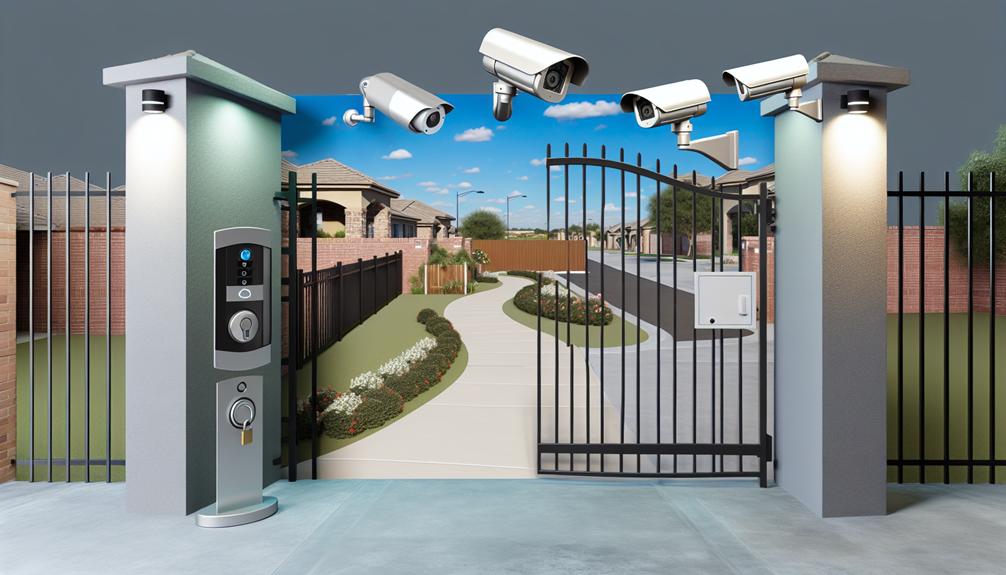Securing our NJ rental properties demands a proactive approach. First, we should thoroughly inspect all entry points and upgrade to high-security locks and deadbolts. Installing security cameras and utilizing smart home technology offers remote monitoring and control. Outdoor lighting, especially motion sensors, can deter potential intruders.
It’s vital to educate tenants about safety, create detailed emergency response plans, and maintain open communication channels. Partnering with local authorities can strengthen crime prevention efforts. Finally, insuring the property for both physical damage and liability guarantees financial protection. By following these steps, we cover all bases for a secure rental property.
Key Takeaways
- Upgrade locks and deadbolts to high-security options for enhanced protection.
- Install security cameras and smart home technology for remote monitoring.
- Enhance outdoor lighting with motion sensor lights and pathway illumination.
- Conduct regular inspections of entry points and existing security systems.
- Foster tenant awareness with safety guidelines and emergency response plans.
Assess Current Security Measures
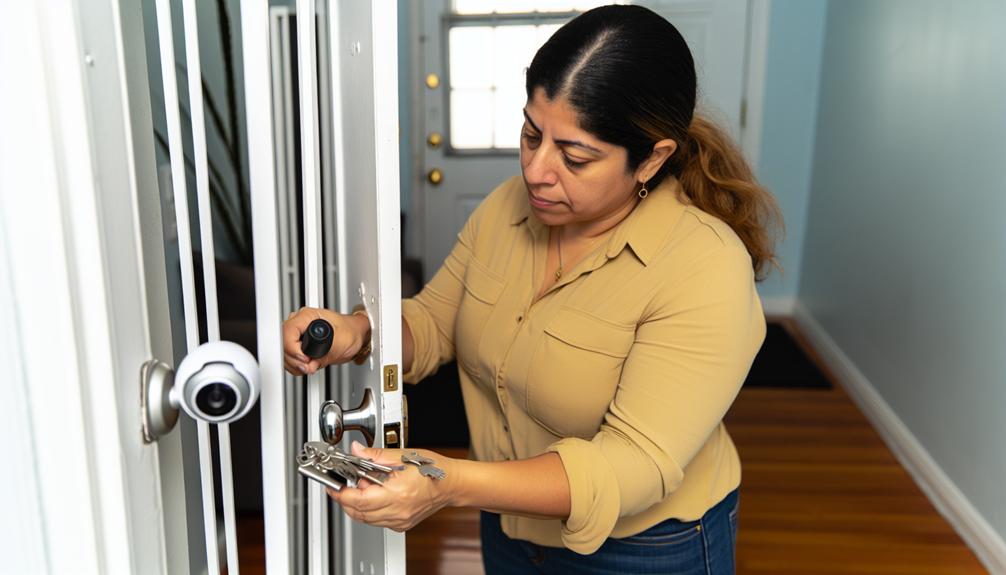
To start securing our NJ rental property, we need to carefully evaluate the current security measures in place. This step is vital as it helps us pinpoint potential vulnerabilities and areas that require improvement. First, we should conduct a thorough inspection of all entry points, including doors and windows, to check for any weak spots that could be exploited. Are there any signs of wear and tear? Are the locks functioning correctly?
Next, let’s assess security gaps by examining the property’s perimeter. Are there blind spots in the existing surveillance system? It’s crucial to pinpoint these areas because they can be exploited by intruders. We should also evaluate the quality and placement of our current surveillance cameras. Are they covering all essential points such as entrances, exits, and parking areas?
To enhance surveillance systems, we should consider upgrading to high-definition cameras with night vision capabilities and motion detection. This ensures that we’ve clear footage, even in low-light conditions. Additionally, integrating our surveillance system with a mobile app can give us real-time alerts and remote access, putting control literally in our hands. By addressing these aspects, we can strengthen our rental property’s security.
Upgrade Locks and Deadbolts
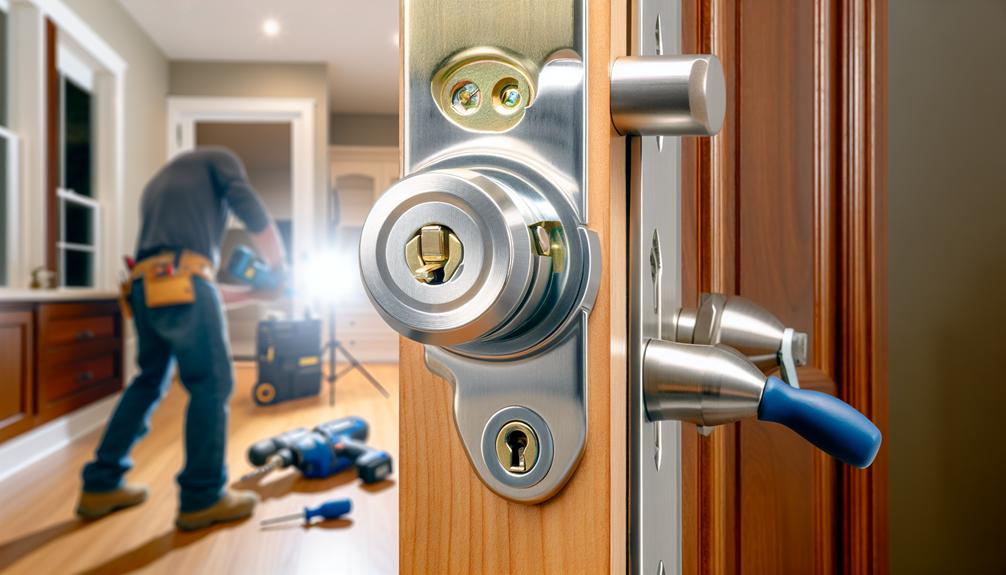
Upgrading our locks and deadbolts is essential for enhancing the security of our rental property. We should choose high-security options that resist tampering and forced entry, ensuring our tenants’ safety.
Regularly inspecting and maintaining these locks will help us address any wear and tear before it becomes a security risk.
Choose High-Security Options
Enhancing security at our NJ rental property starts with installing high-quality locks and deadbolts that deter unauthorized entry. Choosing the right security features can make a significant difference in safeguarding our investment and ensuring tenant peace of mind. We should opt for Grade 1 deadbolts, the highest standard in the industry, which provide superior resistance to picking and forced entry.
In addition to upgrading our locks, integrating a security alarm and a surveillance system can greatly improve our property’s security profile. Modern locks can be paired with smart technology, allowing us to monitor and control access remotely. This means we can receive instant alerts if any unauthorized attempts are made, giving us real-time control over the property.
When selecting locks, it’s important to take into account the material and construction. Hardened steel bolts and anti-drill plates are essential features that can withstand aggressive break-in attempts. We should also think about key control, ensuring that duplicate keys are challenging to make without authorization.
Investing in high-security locks and deadbolts, along with a robust security alarm and surveillance system, provides a thorough security strategy that protects both our property and our tenants, giving us ultimate control and peace of mind.
Regularly Inspect and Maintain
Regularly examining and maintaining our high-security locks and deadbolts guarantees they remain effective in safeguarding our NJ rental property against potential threats. Routine maintenance and thorough property inspections aren’t just best practices; they’re necessary steps in securing our tenants’ safety and peace of mind.
When it comes to maintaining these important security features, we should:
- Schedule Bi-Annual Inspections: We need to examine all locks and deadbolts twice a year. This helps us identify wear and tear that could compromise security.
- Upgrade Older Systems: Keeping up with advancements in lock technology is important. If our locks are outdated, it’s time to invest in newer, more secure options.
- Lubricate and Clean Mechanisms: Regularly lubricating the internal components of our locks ensures smooth operation and extends their lifespan.
- Test Functionality: We should periodically test each lock to make sure they’re functioning correctly. Any lock that sticks or doesn’t engage properly should be repaired or replaced immediately.
Install Security Cameras
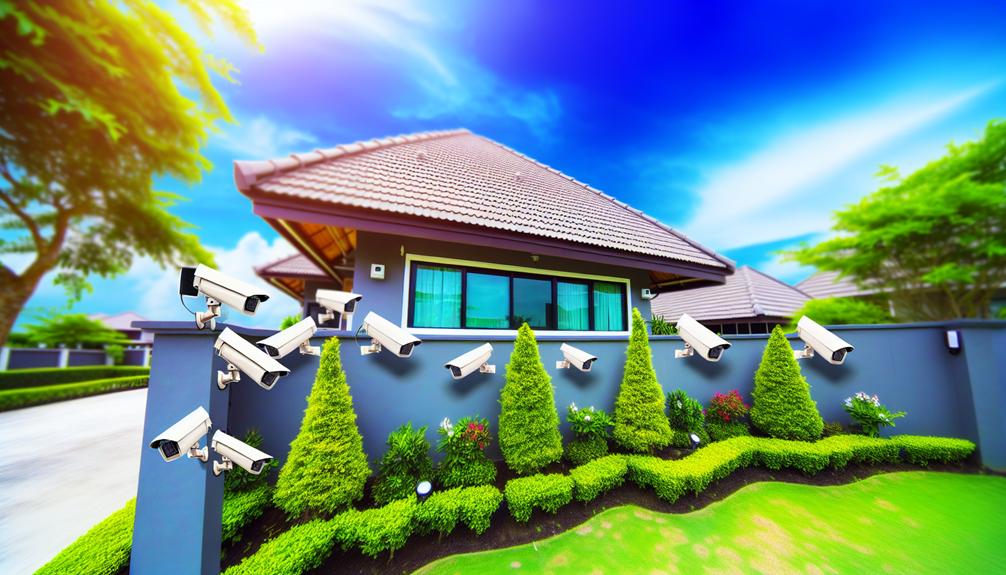
To maximize the security of your NJ rental property, installing high-quality security cameras is an important step. While there are significant monitoring benefits, we must also address privacy concerns.
Strategically placed cameras can deter potential intruders and allow us to monitor activity in common areas, entrances, and exits. This proactive approach not only helps protect our property but also guarantees the safety of our tenants.
When installing security cameras, it’s vital to balance security with the tenants’ right to privacy. We should avoid placing cameras inside living spaces or areas where tenants expect total privacy. Instead, focus on external perimeters, shared spaces, and entry points. Clear communication with tenants about where cameras are installed and how footage is used can go a long way in alleviating any privacy concerns they might have.
Moreover, choosing high-resolution cameras with night vision capabilities ensures that we capture clear footage, day or night. Investing in a reliable storage system or cloud service for camera footage is equally important to guarantee that data is secure and easily accessible when needed. By taking these measures, we maintain control over our property’s security while respecting our tenants’ privacy.
Use Smart Home Technology
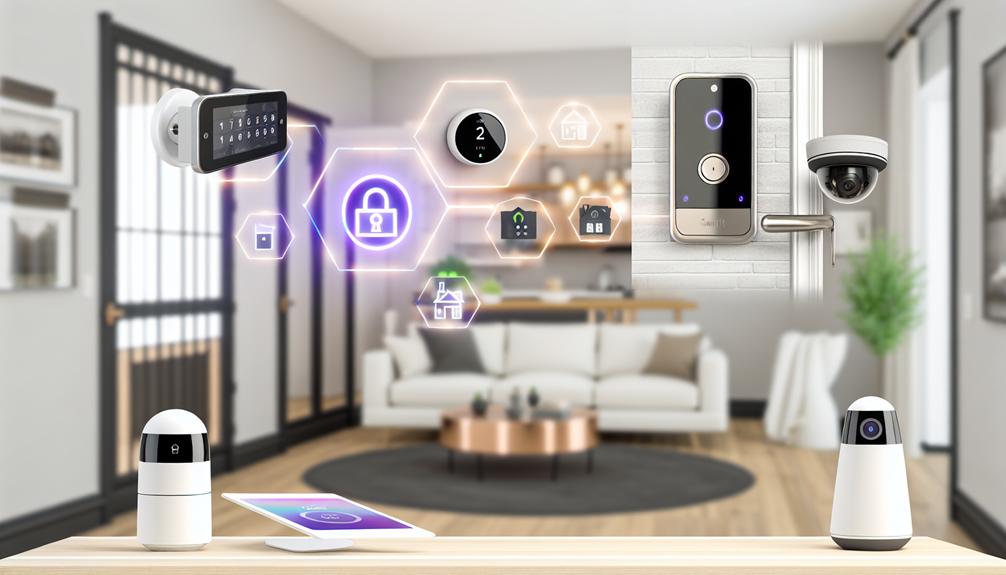
Integrating smart home technology into our NJ rental property can boost security and enhance tenant convenience. As landlords and property managers, we need to leverage the latest advancements to maintain control and guarantee the safety of our properties. Smart home technology not only aids in security but also promotes energy efficiency and allows for remote monitoring.
Here are four essential smart home technologies to think about:
- Smart Locks: These allow us to control access to the property remotely. We can grant or revoke access instantly, providing a higher level of security. Tenants appreciate the convenience of keyless entry.
- Smart Thermostats: These devices can greatly improve energy efficiency by learning tenants’ habits and optimizing heating and cooling schedules. This not only lowers utility bills but also appeals to environmentally conscious tenants.
- Security Systems with Remote Monitoring: Advanced security systems enable us to monitor our properties in real-time from anywhere. Features like motion detectors, door/window sensors, and live video feeds ensure we’re always informed about the property’s status.
- Smart Lighting: While we won’t explore outdoor lighting just yet, indoor smart lighting can deter intruders by mimicking occupancy when the property is vacant. It also contributes to energy efficiency by allowing tenants to schedule or control lights remotely.
Enhance Outdoor Lighting
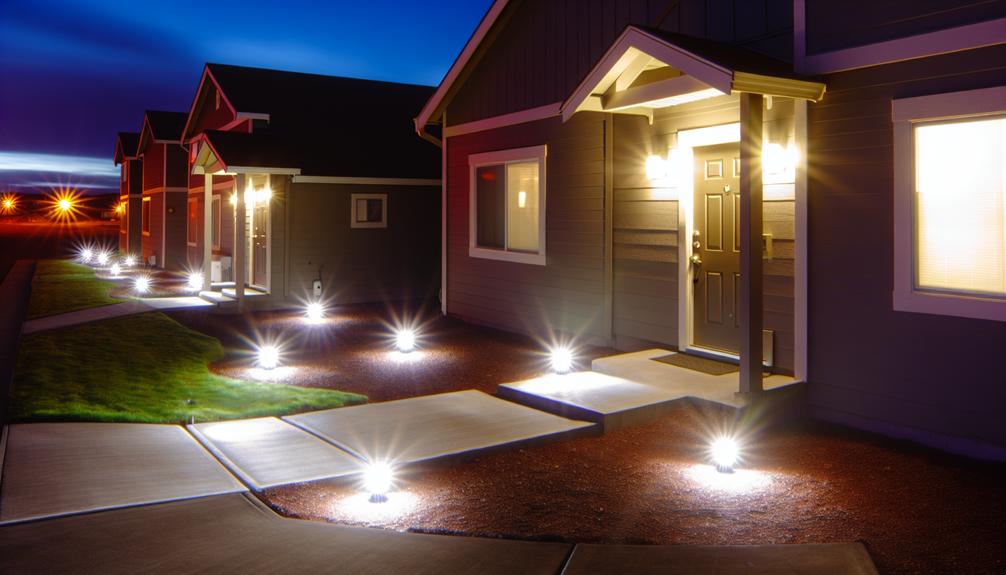
Let’s talk about how improving outdoor lighting can greatly boost the security of our NJ rental properties.
By installing motion sensor lights, we can deter potential intruders and guarantee our tenants feel safe.
Additionally, pathway illumination not only increases visibility but also adds an inviting touch to the property.
Motion Sensor Lights
Installing motion sensor lights around your rental property is an effective way to enhance security and deter potential intruders. These lights offer several advantages that make them a wise choice for landlords and property managers who are serious about protecting their assets.
First and foremost, motion sensor lights contribute significantly to energy efficiency. Unlike traditional lights that stay on all night, motion sensor lights only activate when movement is detected, conserving electricity and reducing utility bills.
Secondly, these lights play a pivotal role in burglary prevention. The sudden illumination can startle would-be intruders, making them think twice about approaching your property. This unexpected light serves as a potent deterrent, signaling that the area is monitored.
Here are four key benefits of installing motion sensor lights:
- Cost Savings: Reduced energy consumption leads to lower electricity bills.
- Enhanced Security: Immediate lighting deters intruders and increases tenant safety.
- Low Maintenance: These lights require minimal upkeep, reducing long-term maintenance costs.
- Increased Property Value: Enhanced security features can make your property more attractive to potential tenants.
Pathway Illumination
Ensuring your rental property’s pathways are well-lit not only enhances curb appeal but also greatly boosts safety for tenants and visitors. Proper pathway illumination is a vital factor in creating a secure environment. We should start by evaluating the existing landscape lighting and identifying any dark spots that could pose a tripping hazard or attract unwanted activity.
By strategically placing lights along walkways, driveways, and entry points, we can notably improve visibility. Solar-powered lights are an eco-friendly option that reduces utility costs, while LED lights provide long-lasting, energy-efficient illumination. It’s crucial to follow safety guidelines when installing these fixtures to guarantee they’re securely anchored and don’t create additional hazards.
We recommend using a mix of low-level lights for pathways and brighter lights for entrances and key areas. This layered approach not only enhances security but also adds a sophisticated aesthetic to the property.
Regular maintenance checks are significantly important to ensure all lights function correctly and replace any burnt-out bulbs promptly.
Incorporating high-quality landscape lighting into our rental properties not only protects our investment but also reassures tenants that their safety is a top priority, fostering a sense of community and trust.
Secure Entry Points
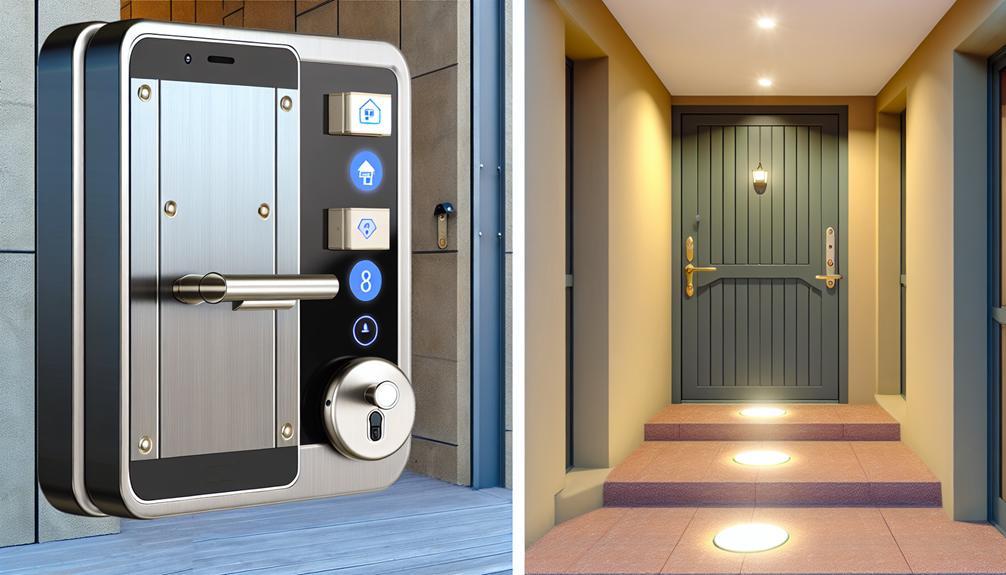
Prioritizing the security of entry points involves strengthening doors, windows, and any other potential access areas to prevent unauthorized entry. To fortify these areas, we must conduct thorough security inspections and make necessary upgrades. Entryway reinforcement should be our top priority, guaranteeing that every door and window is a strong barrier against intruders.
Here are some key measures to think about:
- Install high-quality door hardware: Upgrading to deadbolts and smart locks can greatly enhance security. Guarantee the door frames are reinforced with metal plates to withstand forceful entry attempts.
- Enhance window protection: Invest in shatter-resistant window films and secure all windows with sturdy locks. For ground-floor units, think about installing window bars or grilles for added security.
- Reinforce sliding doors: These are common weak points. Use security bars or rods in the track to prevent them from being forced open. Additionally, place anti-lift devices to stop the door from being lifted out of its frame.
- Conduct regular security inspections: Schedule periodic reviews to identify any vulnerabilities. This proactive approach helps us stay ahead of potential threats and maintains all entry points secure over time.
Implement Access Control Systems
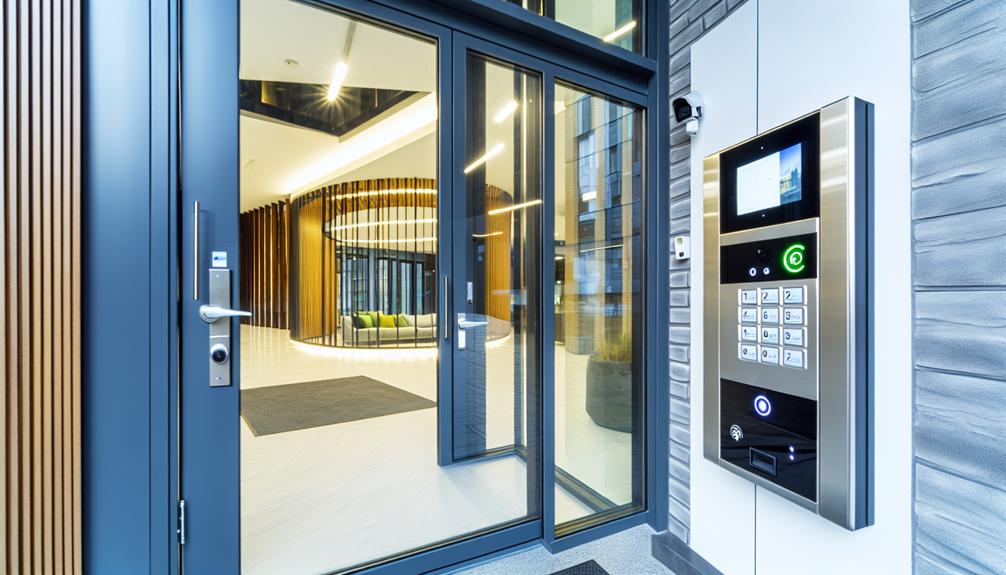
Let’s talk about how implementing access control systems can greatly enhance the security of our NJ rental properties.
By installing smart locks and utilizing keyless entry systems, we can offer tenants not only improved security but also the convenience of managing access remotely.
These technologies reduce the risk of unauthorized entry and eliminate the hassle of lost or duplicated keys.
Smart Lock Installation
Installing smart locks is one of the most effective ways to enhance security and control access to your NJ rental property. These systems offer numerous advantages, allowing us to manage entry points efficiently and securely. Remote access is a key feature, enabling us to open doors from anywhere, whether we’re at the office or on vacation. This level of control can greatly reduce the risks associated with lost keys or unauthorized access.
Moreover, smart locks bolster data security. They log every entry and exit, providing a detailed record of who accessed the property and when. This information is invaluable for monitoring tenant activity and ensuring compliance with property rules.
To implement smart locks effectively, consider the following steps:
- Choose a Reliable Brand: Opt for a reputable manufacturer known for high-quality locks and robust security features.
- Set Up Remote Access: Configure the system to enable remote locking and opening, giving us control even when we’re not on-site.
- Integrate with Security Systems: Connect smart locks with existing security systems for a thorough approach to property management.
- Regularly Update Firmware: Keep the smart locks’ software up-to-date to protect against new security threats.
Keyless Entry Benefits
By implementing access control systems, we can greatly enhance the security and convenience of our NJ rental property through keyless entry benefits. Keyless entry installation offers numerous advantages that traditional lock-and-key systems simply can’t match.
First and foremost, keyless entry eliminates the risk of lost or stolen keys, reducing unauthorized access. Tenants can enter their units using a code, smartphone app, or keycard, providing a seamless and secure experience.
Remote access is another pivotal feature. We can manage and monitor entry to the property without needing to be physically present. This is especially useful for emergency situations or when facilitating maintenance visits. We can grant temporary access to contractors or new tenants with just a few clicks, ensuring that our property remains secure at all times.
Moreover, keyless entry systems can integrate with other smart home technologies, offering a complete security solution. These systems can log entry and exit times, giving us detailed insights into property access patterns.
This level of control not only boosts security but also enhances tenant satisfaction by providing them with a modern, hassle-free living experience. Essentially, keyless entry is a smart investment that pays off in both security and convenience.
Conduct Regular Inspections
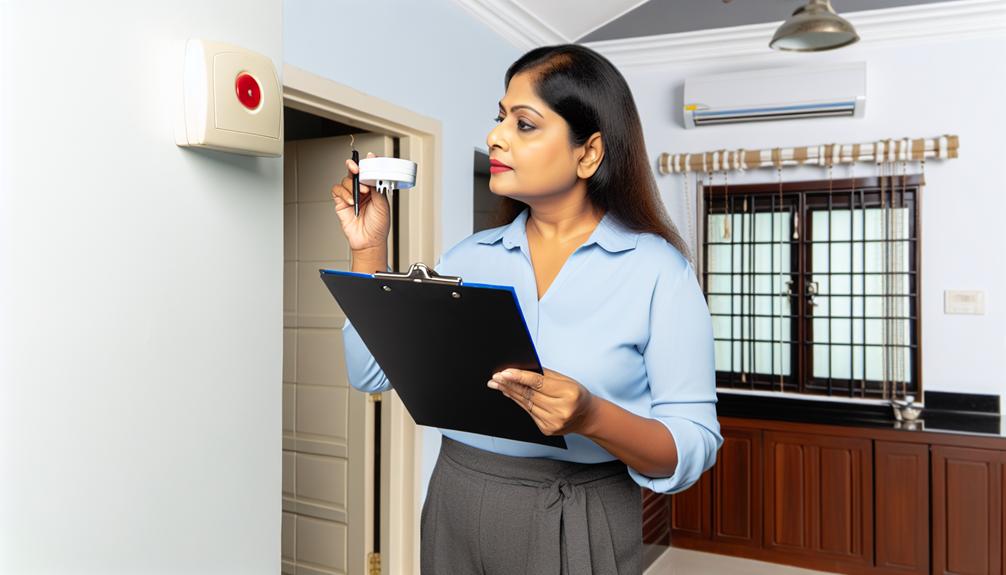
Regular inspections are important for maintaining the safety and condition of our NJ rental property. They help us identify potential issues before they escalate, guaranteeing our investment remains secure and our tenants are safe. However, it’s vital to balance thorough inspections with tenant privacy and rights.
We should always prioritize clear and respectful communication regarding inspection scheduling. Here’s how we can conduct effective inspections:
- Plan Ahead:
Schedule inspections at regular intervals, such as quarterly or bi-annually. Notify tenants well in advance to respect their privacy and accommodate their schedules.
- Use a Checklist:
Develop a detailed inspection checklist that covers all key areas, such as plumbing, electrical systems, safety devices, and structural integrity. This ensures nothing is overlooked.
- Document Findings:
Take detailed notes and photos during each inspection. This documentation helps track wear and tear over time and provides evidence if repairs are needed or disputes arise.
- Address Issues Promptly:
Follow up on any problems identified during inspections as soon as possible. Prompt action not only maintains the property but also shows tenants that we’re proactive and responsible landlords.
Foster Tenant Awareness
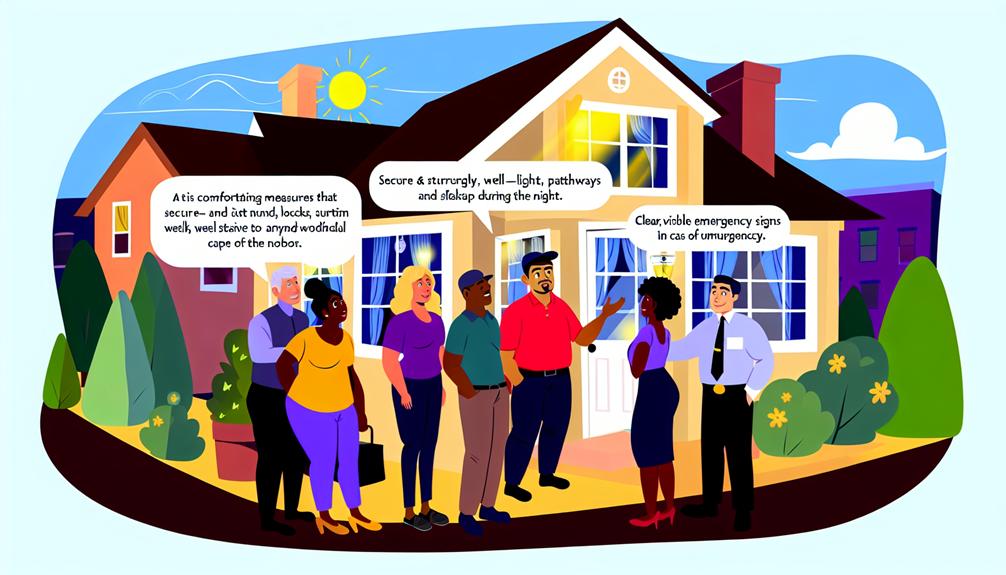
Empowering our tenants with important safety information and guidelines is necessary for fostering a secure living environment in our NJ rental property. Tenant education should be a cornerstone of our strategy. By offering thorough resources and regular workshops, we guarantee our tenants are well-informed about safety protocols and best practices.
This includes everything from understanding the importance of locking doors and windows to recognizing and reporting suspicious activities.
Community engagement plays a pivotal role in this effort. Organizing neighborhood watch meetings and fostering open communication channels among tenants can notably enhance the overall security of the property. Encouraging tenants to get to know each other builds a sense of community and shared responsibility, making everyone more vigilant and proactive.
We should also provide tenants with written materials, such as safety checklists and emergency contact information. These resources should be easily accessible and regularly updated. By integrating these educational initiatives into our tenant onboarding process, we create a culture of awareness and preparedness from the start.
Ultimately, a well-informed tenant is our first line of defense in maintaining a secure rental property. Engaging our community and prioritizing tenant education will make our NJ rental property a safer place for everyone.
Create Emergency Response Plans
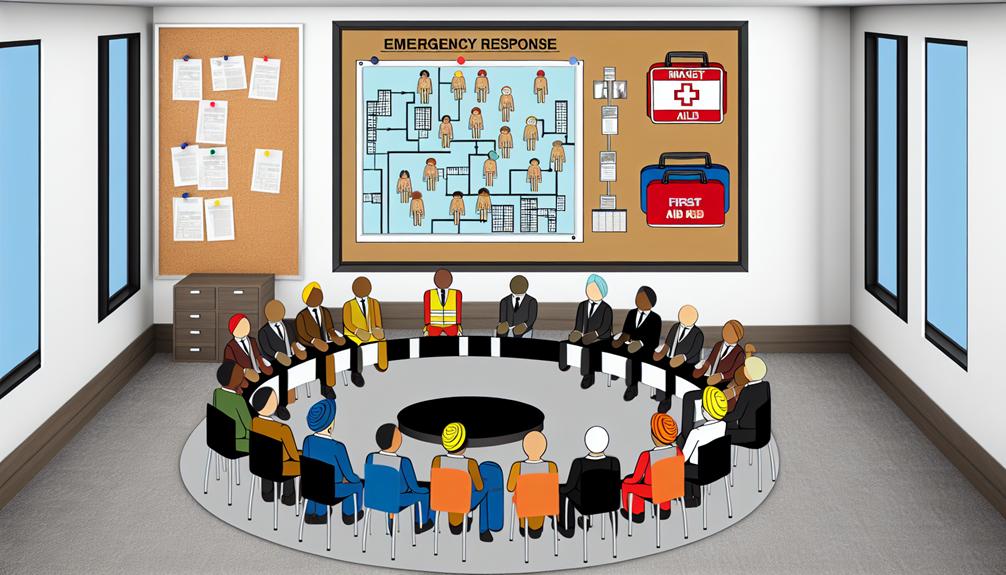
Establishing a comprehensive emergency response plan is crucial to safeguard the safety and well-being of our tenants in any crisis situation. We need to be proactive in creating evacuation routes, designating emergency contacts, and setting up a robust communication plan. By taking these steps, we guarantee our tenants feel secure and know exactly what to do when faced with an emergency.
Here’s a detailed approach to creating an effective emergency response plan:
- Create Evacuation Routes: Clearly mark and communicate multiple evacuation routes for your property. Assure all tenants are aware of these routes and conduct regular drills to keep everyone prepared.
- Emergency Contact Information: Compile and distribute a list of emergency contact numbers, including property management, local fire and police departments, and medical services. Make sure this list is easily accessible to all tenants.
- Communication Plan: Establish a reliable communication plan for disseminating information during an emergency. This could include SMS alerts, email notifications, or a dedicated emergency phone line.
- Regular Updates and Reviews: Regularly review and update the response plan to address any new risks or changes to the property. Engage tenants in these reviews to guarantee their concerns and suggestions are considered.
Collaborate With Local Authorities

Partnering with local authorities ensures we have the support and resources needed to effectively manage and secure our rental property. Establishing community partnerships with law enforcement and municipal agencies is essential for proactive crime prevention. By working closely with police departments, we can gain valuable insights into local crime trends and receive timely alerts about potential threats in our area. This cooperation allows us to implement targeted safety measures and stay one step ahead.
Creating a neighborhood watch program is another effective strategy. By facilitating regular meetings and communication channels between tenants and local authorities, we foster a sense of shared responsibility for our community’s safety. These programs not only deter criminal activity but also empower our tenants to take an active role in maintaining a secure environment.
Additionally, participating in local safety initiatives can significantly enhance our property’s security. Collaborating with authorities on projects like improved street lighting, enhanced surveillance systems, and community policing efforts ensures that we’re leveraging all available resources to protect our investment. By prioritizing these partnerships, we demonstrate our commitment to crime prevention and create a safer, more attractive living environment for our tenants.
Insure Your Property
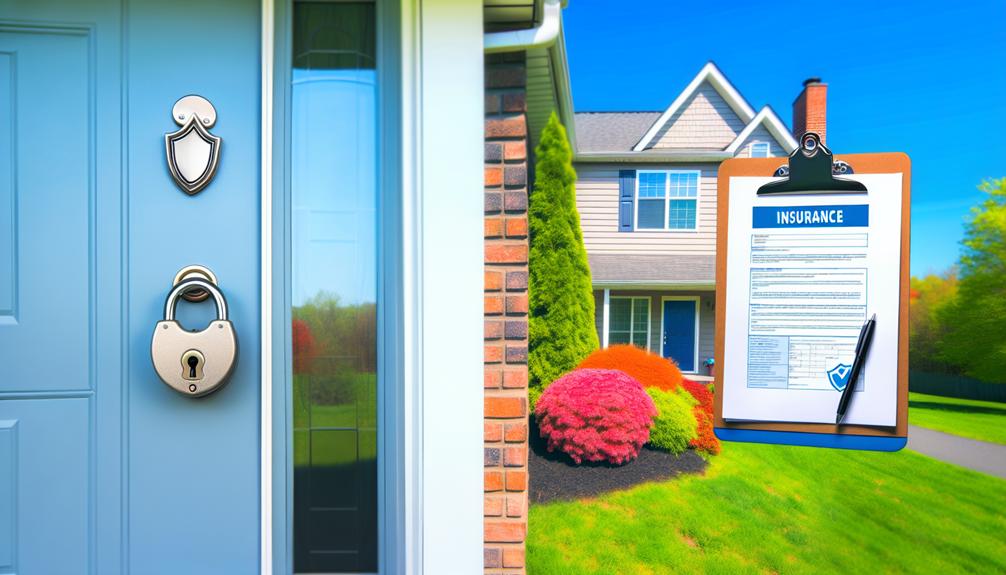
Securing extensive insurance coverage for our rental property is a vital step in safeguarding our investment against unforeseen risks. Making sure we’ve a robust policy in place helps us manage potential financial losses and provides peace of mind. Here are four key aspects to keep in mind:
- Property Insurance: This covers the physical structure of our rental property against damage from events like fire, storms, or vandalism. It’s crucial to have sufficient coverage to rebuild or repair the property if needed.
- Liability Protection: This is important for protecting us from legal and financial responsibilities arising from tenant injuries or accidents that occur on the property. It can cover medical expenses, legal fees, and settlements.
- Loss of Rental Income: If our property becomes uninhabitable due to a covered event, this insurance guarantees we still receive rental income. This can be a lifeline in maintaining cash flow during repairs or rebuilding.
- Flood and Earthquake Insurance: Standard property insurance often doesn’t cover these natural disasters. Assessing the risks and adding these coverages can prevent significant out-of-pocket expenses.
Maintain Open Communication Channels

Maintaining clear and consistent communication channels with our tenants is vital for fostering a positive landlord-tenant relationship and swiftly addressing any issues that may arise. Effective tenant communication guarantees that we’re promptly aware of any concerns, from minor maintenance requests to more significant emergencies.
Establishing emergency protocols is pivotal; tenants should know precisely how to contact us in urgent situations, whether through a dedicated phone line or a reliable messaging system.
We should also keep our tenants informed about regular maintenance schedules and any upcoming property updates. This transparency not only builds trust but also helps prevent misunderstandings. For instance, if we schedule routine inspections or pest control treatments, notifying tenants well in advance allows them to plan accordingly and reduces inconvenience.
Utilizing digital tools like property management software can streamline communication, making it easier to send updates, receive maintenance requests, and track responses. By leveraging these tools, we can maintain a documented history of interactions, which is invaluable for resolving disputes and ensuring accountability.
Essentially, maintaining open communication channels not only enhances tenant satisfaction but also safeguards our property investment by allowing us to address issues proactively.
Frequently Asked Questions
How Can I Handle Tenant Disputes Regarding Security Concerns?
We can manage tenant disputes regarding security concerns by utilizing mediation services and applying conflict resolution techniques. By addressing issues promptly and professionally, we guarantee a secure, harmonious living environment, meeting tenant needs and maintaining control.
What Are the Best Practices for Screening Potential Tenants?
The best practices for screening potential tenants involve a thorough tenant screening process, including background checks, credit check, and rental history evaluation. We guarantee we select reliable tenants, reducing risks and maintaining control over our property.
How Should I Handle Security Deposits Related to Property Damage?
When handling disputes and initiating the refund process, we should document property conditions pre- and post-lease, communicate clearly with tenants, and follow state laws meticulously. This guarantees fairness, minimizes misunderstandings, and maintains our control over the situation.
Can I Legally Evict a Tenant for Violating Security Policies?
We can evict a tenant for violating security policies, but we must consider tenant rights and legal implications. We should guarantee our lease agreements are clear and comply with state laws to enforce security measures legally and effectively.
What Steps Should I Take to Secure Vacant Rental Properties?
Like a fort guarding its treasures, let’s conduct regular property inspections and install surveillance systems. Secure our vacant property has secure entrances to deter intruders. These steps will maintain security and give us peace of mind.
Conclusion
By implementing these security measures, we can protect our rental properties and guarantee our tenants feel safe.
For example, after upgrading to smart locks and installing security cameras, one landlord saw a significant drop in break-ins and tenant complaints. It’s clear that proactive steps make a real difference.
Let’s stay ahead of potential threats, collaborate with local authorities, and maintain open communication.
Together, we’ll create secure and welcoming environments for everyone.

